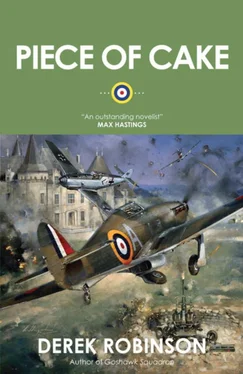Patterson saw it happen. Less than a minute had passed since he led Quirk into the attack and already Patterson had wet himself twice: once when a bomber exploded in front of him and a gun-turret whirled by, no more than six feet from his prop; and once when he was climbing and a pair of 109’s stormed toward him, apparently obsessed with collision. Patterson had been convinced there was no escape, yet he made the gesture of frantic action and his Hurricane bounced like a ball on the Shockwave. When he got it under control again he was alone. He saw the pair of 109’s far below, closing on a Hurricane that was last in a line of planes. The Hurricane flipped onto its back and went into a spin.
Patterson was enraged. He charged after the Messerschmitts and eventually caught one. It broke hard left and he followed. At once they were in a tail-chasing circle. Patterson hated this. His mouth was stretched wide open, straining to drag breath into lungs that felt flattened by the leaden clamp of g-forces as he dragged the plane into a circle so tight that he felt nailed to his seat and his vision threatened to fade into grayness. That was what he dreaded most: weakening for the one second it would take that 109 to catch him and blast him.
He forced his head to turn, and was rewarded with a glimpse of a tail-unit. A blurred swastika registered. Mightily encouraged, he dredged up some strength and bullied the Hurricane until his arms and legs throbbed and trembled. More reward! More tail-unit, a chunk of fuselage, and yet more, a 2, a German cross, a 6, wingroots, cockpit… Patterson fired, and shot off the Messerschmitt’s tail-wheel. Nothing else. The tail-wheel flicked away, and he swore, but the blow was enough to startle the German pilot, and he did the worst possible thing: he changed his turn. The 109 floated generously across Patterson’s gunsight and he fired again and missed again. It was impossible, but he missed; and when he looked again the enemy had gone.
Six thousand feet below, Steele-Stebbing’s machine was still spinning clumsily to earth, thrashing its tail as if it wanted to snap it off. Steele-Stebbing felt no pain. He felt a huge shock. God had turned his world inside out and upside down, and his left arm was flopping and spraying as the plane threw it about, but it took him several seconds to believe that the stump was his and so this bloody lump of sleeve getting flung about the cockpit was his too. The Hurricane thrashed and the severed arm bashed him in the face. His brain was elsewhere, outside this little red madhouse, observing with horror and disbelief, struggling to cope with the disaster, that was saturating everything with blood. The Hurricane kicked viciously and the rogue arm shot out of the broken canopy and vanished. At last his brain, caught up. He snatched at the stick, stamped on the pedals, killed off the spin. With the stick jammed between his knees he slammed his hand on the gushing stub of his left elbow, found the artery and stopped the jet. Everything around him dripped red.
At three thousand feet, Cattermole flew alongside. “Someone bust your window,” he said.
Steele-Stebbing dragged the stub up to his mask and used his right thumb to flick the R/T switch. “One of your rough friends,” he said.
Cattermole rolled over the top and took a look from the other side. “I can’t see in,” he said, “so how the hell can you see out?”
Steele-Stebbing couldn’t reply. He was starting to feel very shaky. The stick was slipping.
“You want to chuck that kite away,” Cattermole advised. “Get out and walk.”
Steele-Stebbing had thought of it. The problem was that to open the hood he would have to let go of his arm. In any case he didn’t feel strong enough to drag back the hood. Always assuming it wasn’t jammed.
“If you can still work the doings,” Cattermole said, “I’ll talk you down.”
Steele-Stebbing heard that but he didn’t really understand: it was like words clearly typed but written in a foreign language. His thumb was getting weak and the throbbing wetness was pumping out again. Quite easily and peacefully he fell asleep. His knees came apart and the stick twitched nervously.
Cattermole flew with him to the end. The Hurricane hit the face of the South Downs at just under two hundred knots. In less than a second, thirty-one feet of fighter was smashed down to nine feet, the wings ripped off and discarded, the propeller blades left behind the tail, the seat and back-armor crushed into the reserve tank, the tank collapsed into the engine. Mixed up with the armor and the tank and the engine was what was left of Steele-Stebbing.
Three miles higher, Cox was having no luck at all. His targets always flinched out of the way of his bullets, and several unidentified enemies had frightened the life out of him. Also his wingman, Jolliff, had vanished. So far, it wasn’t Cox’s day.
A 109 dived in front, trailing smoke. He stuffed the nose down and the Merlin cut out for a second or two. Bits of dust and dirt rose from the cockpit floor. The Merlin picked up, and two miles below him was the sea, revolving gently to the right as he spiraled down in search of that smoking 109.
It was the wrong thing to do. He knew it as soon as he did it: chasing singleton Jerries downhill was a mug’s game, everyone said so. Too late now. In the corner of his eye he saw a spurt of flame and hoped it wasn’t Jolliff. He felt guilty about Jolliff. The smoking 109 seemed to be getting away. Cox heard a faint trickle of popping noises and then his Hurricane got bashed nine times in two seconds with such ferocity that the prop fell off.
He never saw the 109 that hit him. He hauled back the stick and tasted bile. The plane wallowed into a clumsy glide. Another bang, and the engine caught fire: flames as big as bedsheets; the heat came surging through the Perspex. He slammed the plane into a sideslip that washed the blaze away from him, heaved back the canopy and dived out.
The sea was still a long way below when his parachute opened. No ships were in sight. Cox couldn’t swim, he hated water, and he couldn’t tolerate the thought of a slow, cold death in it. He took his revolver from his flying boot and wondered what was the best way to shoot himself. While he was wondering he noticed that the wind was quite strong. He was drifting toward land. He dropped the revolver and watched it fall at enormous speed.
With his radio dead and his engine coughing and shaking, Pip Patterson flew away from the raid, across the Thames estuary, and searched for a landing-ground. There were plenty of other stray aircraft limping home. He followed one down. It wasn’t until he was over the village church that he realized he was back at RAF Kingsmere in Essex.
He parked a long way from the tower. Nobody signaled or came out to see him. He switched off, climbed out and sat on a wing. The noise of the enemy raid was a distant grumble. His engine ticked and hissed as it cooled. Otherwise everything was calm and tranquil. The breeze played with a strip of torn fabric on his fuselage.
It was almost exactly a year ago that they had flown out of Kingsmere. As Patterson took off his Mae West and unzipped his jacket, those twelve months flickered through his brain. There was no pattern or purpose to his memories: just a jumble of faces and places, of scrambles and scraps and parties and popsies and more scrambles and crashed kites and yet more scrambles and endless bloody battle-climbs. Most of the faces he remembered had no names. Patterson didn’t try to remember them. He didn’t try to do anything. All he knew was that he was dead tired and he never wanted to fly again. The air smelled sweet. Just breathing it was a pleasure. He lay on his back and closed his eyes.
By now many of Hornet squadron had broken off the fight and were returning to base: fifteen seconds’ worth of ammunition was soon gone. Moggy Cattermole, however, was still climbing. He had ammunition left, and there were stragglers to be potted.
Читать дальше












